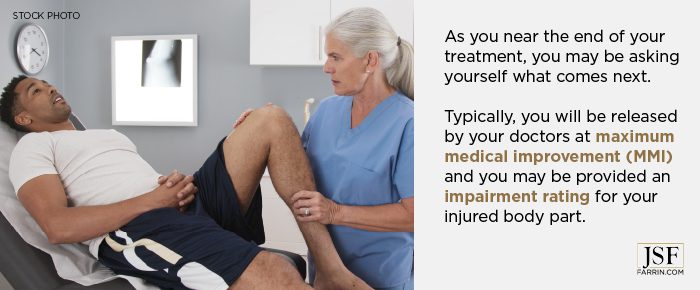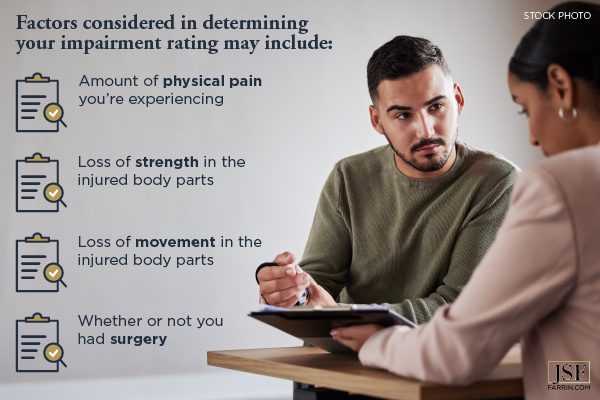Nobody wants to get hurt on the job. Unfortunately, workplace injuries are a hazard of many different occupations and industries. Fortunately, South Carolina law generally requires employers with 4 or more employees to purchase workers’ compensation insurance.
Injured workers are generally entitled to three main benefits:
- Medical treatment (including prescriptions, MRIs, medical equipment, etc.)
- Temporary Total Disability benefits
- Permanent Partial or Permanent Total Disability benefits
If the treating medical provider has taken you completely out of work or placed you on work restrictions that your employer can’t accommodate, you may be entitled to Temporary Total Disability benefits (TTD), which are typically paid via weekly checks so long as you are out of work.
As you near the end of your treatment, you may be asking yourself what comes next. Typically, you will be released by your doctors at maximum medical improvement (MMI) and you may be provided an impairment rating for your injured body part.
At this point in time, most injured workers have a lot of questions like:
- What does MMI mean?
- What does the impairment rating my doctor gave me mean?
- How much is my case worth?
- Who determines how much compensation I’m owed for my permanent impairments and work restrictions?
- What if I disagree with them?
As a workers’ compensation attorney, I’ve helped many people answer those questions and navigate the workers’ comp process. Here’s what you need to know.
What Does It Mean When I’ve Reached Maximum Medical Improvement (MMI)?
In workers’ comp law, MMI is the point in your recovery process where no further improvement is expected according to generally accepted medical treatment.
While MMI means you are considered to have recovered from your injury as much as possible, it doesn’t mean you’re fully healed.
It’s possible that you might still have ongoing pain, loss of function, and impairment – even after having reached MMI. Oftentimes, my clients may require regular follow-ups with their treating physicians and quite frequently clients will require ongoing prescription medications. Additionally, on some occasions, doctors will even recommend potential future surgeries.
What Is My Impairment Rating and Why Does It Matter?
An impairment rating is a percentage that indicates how much permanent loss of function you’ve suffered because of your injury, and whether it is temporary or permanent.
If you’ve reached MMI but you’re still experiencing ongoing pain or loss of function due to your injury, and standard medical care is unable to treat it, the doctor may give you an impairment rating, which is usually determined by referencing the American Medical Association (AMA) Guides to the Evaluation of Permanent Impairment.
The AMA Guides “provide a reliable, repeatable measurement framework for assessing permanent impairment and have been the trusted gold standard by physicians, patients, and the legal and regulatory communities.”
However, there is no law in SC that requires a medical care provider to use the AMA Guides or to give you an impairment rating. In fact, many times injured workers have injuries that heal and don’t cause any permanent loss of function.
Factors considered in determining your possible impairment rating may include:
- Whether or not you had surgery
- Loss of strength in the injured body parts
- Loss of movement in the injured body parts
- Amount of physical pain you’re experiencing
To help determine an impairment rating, doctors will often send their patients for a functional capacity evaluation (FCE) performed by a trained physical or occupational therapist. Generally, FCEs evaluate your capacity to physically function, usually in the context of your work.
Regardless of whether your doctor sends you for an FCE, they will typically examine you prior to releasing you at MMI and will assign you an impairment rating from 0 to 100, if they deem necessary.
Oftentimes, injured workers disagree with their assigned impairment rating. If this happens, an attorney can help you seek a second opinion or may recommend that you take an independent medical examination (IME).
Contact us if you disagree with your impairment rating and we can talk about the different options available to dispute that rating.
But What Does the Impairment Rating Mean?
Once the doctor determines your permanent impairment rating, if the parties are unable to reach an agreement on the value of your case, either party may request a hearing with the South Carolina Workers’ Compensation Commission (SCWCC) to determine what you may be entitled to in permanent disability benefits.
The impairment rating is not the only thing considered in SC when determining your disability. There are multiple factors that must be considered when determining your disability. However, the impairment rating can be significant in that it represents an objective, quantifiable level of disability as determined by a physician, and it can influence the amount of compensation you may receive.
The AMA Guides Definition of Impairment & Disability
All injured workers should understand that impairment does not equal disability. According to the AMA’s Guides, impairment is defined as “a loss, loss of use or derangement of any body part, organ system or organ function.”
Also, “impairment percentages or ratings developed by medical specialists are consensus-derived estimates that reflect the severity of the medical condition and the degree to which the impairment decreases an individual’s ability to perform common Activities of Daily Living (ADL), excluding work.”
Finally, under SC workers’ compensation law, disability is defined as the “incapacity because of injury to earn the wages which the employee was receiving at the time of injury in the same or any other employment.”
All this means that impairment ratings are trying to define how your injury impacts your strength, range of motion, and ability to perform everyday tasks – not necessarily to determine your ability to perform your work duties.
What the Difference Between Disability and Impairment Means for Your Case
An injured worker could receive an impairment rating and have minimal disability associated with their injury, or the opposite may be true.
For example, consider an employee who sits for most of the day while they work and then consider another employee who works in a labor intensive “heavy duty” job that requires them to be on their feet most of the day. These employees could have identical knee injuries and obtain the same impairment rating to their injured body part. However, do they have the same disability? Of course not.
Therefore, it is important to remember that injured workers are not entitled to an award for impairment. Instead, the South Carolina Workers’ Compensation Commission (SCWCC) will ultimately decide your level of disability, if needed, which may or may not exactly match your impairment rating.
Types of Permanent Disability Benefits
There are two kinds of disability benefits you can receive for your permanent impairment:
Permanent Partial Disability Benefits (PPD)
These benefits may be awarded when an injured employee is assigned an impairment rating for a permanent injury involving either:
- just one body part; or
- 49% or less disability (loss of use) of their back
Each body part is given a value according to SC workers’ compensation law. The SCWCC uses the impairment rating, along with several other factors, to determine your level of disability, including:
- Your age
- Your education level
- Your work history and skill
- Permanent work restrictions
Any SCWCC award is based on the unique circumstances of your case. Remember that your impairment rating is simply a “piece of the puzzle” when determining your disability.
For example, someone with a lack of formal education, a work history with only labor-intensive jobs, and permanent work restrictions will likely have a higher PPD award than someone who can still do their job despite their impairment and work restrictions.
Permanent Total Disability Benefits (PTD)
PTD awards are for workers who have suffered serious injuries with significant permanent work restrictions. These benefits may be awarded when an injured employee has suffered permanent injuries involving:
- two or more body parts; or
- greater than 50% disability (loss of use) to their back or spine
Keep in mind that psychological injuries associated with your accident (depression, anxiety, etc.) can be included as an injury to an additional body part.
Obtaining a PTD award requires injured workers to prove they have suffered a total loss of wage-earning capacity. In other words, the injured worker’s injuries are so severe, their permanent work restrictions won’t allow them to go back to work regardless of their education or work experience.
How Long Can You Receive PTD for?
Total and permanent disability benefits pay out for 500 weeks (minus whatever weekly benefits you have already been paid while out of work) and are usually paid in a lump sum.
In the extremely unfortunate circumstance in which an employee dies, the deceased employee’s dependents may be entitled to 500 weeks of benefits.
Note: The weekly benefits cap of 500 weeks is not applied if an employee’s injury leaves them paralyzed (either quadriplegic or paraplegic) or permanently brain-damaged – these workers are generally entitled to weekly benefits for life.
How Much Are Permanent Disability Benefits?
This is based on your average weekly wage (AWW). Your AWW is based on your before-tax earnings for the 52 weeks before your injury.
To find out your potential compensation rate, multiply your Average Weekly Wage by .6667.
Note: The compensation rate cannot exceed the maximum amount in the state of South Carolina as determined annually by the SCWCC. For 2023, the maximum compensation rate is $1,035.78 per week.
Example of Permanent Disability Benefits
Each body part has a maximum number of weeks associated with it as the cap for weekly benefits. For example, if you were to tragically suffer an injury to your leg so severe that it needed to be amputated, leaving you with 100% loss of use of your leg, the SCWCC would likely award you the full 195 weeks of benefits available for the leg. The amount of benefits would be based on two-thirds (66 2/3%) of your AWW, but not more than $1,035.78 per week for 2023.
However, if you were to lose an arm and a leg in the same tragic workplace accident, you would likely be considered permanently and totally disabled and entitled to the full 500 weeks of benefits (minus the weekly benefits paid until MMI).
As you can see, determining the value of your claim is much more complicated than just figuring out the value of the impairment rating. For example, under certain circumstances, South Carolina law allows injured workers to include wages from another job when calculating their AWW and compensation rate.
Making sure you are getting paid the correct amount is vital to your case and is another reason to strongly consider hiring a South Carolina workers’ compensation attorney.
Do You Need a Workers’ Compensation Attorney to Seek Permanent Disability Benefits?
An attorney can significantly increase your odds of success. When you’ve been injured on the job, you want to quickly get your life back to normal as much as possible. While you focus on recovering, your attorney can fight for you to receive workers’ compensation benefits in full.
Workers’ comp law can be complex and is filled with pitfalls that can reduce your possible payout – but your attorney can be your guide throughout the entire process, from filing a claim to appealing your case through the appellate court system if needed.
Your workers’ comp attorney can:
Represent you to the insurance company
The workers’ compensation insurance company will want to communicate with you throughout the claims process and may try to use what you say and do against you. Your lawyer will deal with them for you instead so that you can just focus on getting better.
Fight for all the compensation you may deserve
Many workers’ compensation insurance companies may try to pay you as little as possible or nothing at all. An attorney is your advocate and helps you level the playing field.
Try to protect you from retaliation
Retaliation can sometimes occur against employees who pursue workers’ compensation claims. It can take the form of discrimination, wrongful demotion or termination, and other situations to make you feel unpleasant, uncomfortable, or unappreciated at work. A workers’ compensation attorney will try to ensure that your employer does not retaliate against you for filing a claim.
Help you try to receive better medical care
After you’ve been injured, you’ll probably be sent to a doctor chosen by your employer’s workers’ compensation company. The doctor might release you to go back to work before you feel ready, or they might assign you permanent work restrictions or an impairment rating you disagree with. These factors can all affect your potential settlement. A workers’ compensation lawyer can help you try to get a second opinion and increase your settlement amount.
Support you every step of the way
The workers’ compensation process can be confusing. Meanwhile, the workers’ compensation insurance company handles claims like yours all the time, and they are not looking out for your best interests. The sooner you engage a workers’ compensation lawyer for your claim, the sooner they can get started fighting for you to try to receive maximum compensation.
Remember: While your employer and their workers’ compensation insurance company are almost certainly motivated to minimize any payout to you, your attorney works on a contingency fee basis and only collect an attorney’s fee if they recover for you.2
Get Your Free Case Evaluation Today
A South Carolina workers’ compensation lawyer from the Law Offices of James Scott Farrin is on your side. We have extensive knowledge, abundant resources, and a strong track record of helping injured workers.
Since 1997, we’ve recovered more than $1.8 billion in total compensation for more than 65,000 people.1
In 2023, we were named to the “U.S. News – Best Lawyers” ‘Best Law Firms’ list for the ninth year in a row and achieved a Tier 1 ranking (the highest) for Workers’ Compensation law – Claimants.3
Give us a call now at 1-866-900-7078 or contact us online for your free case evaluation.








